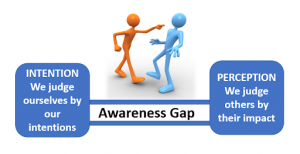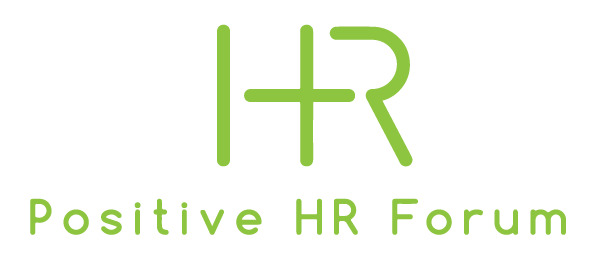
18 Jul Are you one of those managers?
Some of us will have heard the saying ‘we join an organisation, we leave a manager’. I have observed this play out too many times to count.
Are you one of those managers? ‘Of course not,’ you exclaim. None of us believes that we are THAT manager!
As managers, we have many pulls on our time and energy that can impact how others interpret our actions. We want to do a good job, and we don’t wake up in the morning with the intention of being a lousy manager. Yet juggling many different people and priorities and working at a sometimes expected ‘fast pace’, be that self-imposed or imposed by others, there is often a gap between our intentions and perceptions.

How to bridge the intention versus perception gap?
We all communicate. While that statement sounds simple enough, many things come into play, such as:
- how we feel about the person
- the situation
- generational differences
- our values or beliefs
- how we think and behave.
This all leaks into how we communicate intentionally or not, for better or worse. The message we deliver can also be coloured uniquely by the person receiving the communication because of their view of the world and experiences.
“We do not see things as they are, we see things as we are.” Anaïs Nin
One thing that often stops us from bridging this communication gap is the strength of our relationship. Have you ever noticed how sometimes the toughest of conversations turn out to be easy and other times, what should be the easiest of conversations is tough? This can often happen because the relationship foundations on which the conversation is being held are already in a bad place.
Often, when I have coaching conversations with leaders, it can be helpful to step away from a problem and explore the relationship of the people involved. If we can change the dynamics of the relationship, this, in turn, changes the situation.
Seek ways to strengthen relationships
If you want to increase the effectiveness of your communication and relationships, reviewing your levels of emotional intelligence will serve you well in business and life.
We’ve all heard the phrase ‘treat people how you want to be treated’. The extension to this phrase is to ‘treat people how they want to be treated’. But how do we know how people want to be treated? An excellent place to start is to be curious about others and do what we can to expand our understanding of others’ behaviours, thinking, values and beliefs beyond their current capacity.
There are many ways of doing this, and increasing emotional intelligence will help us get this right more often.
In the words of Daniel Goleman, “emotional intelligence is a skill set that anyone can acquire”.
Emotional intelligence (EI) includes our levels of personal intelligence, self-awareness (being aware of our behaviour, feelings and attitude) and self-management (taking appropriate action to manage ourselves), and our interpersonal intelligence, awareness of others (picking up on what is going on for others) and relationship management (taking appropriate action to manage others).
Understanding your own thinking and behavioural preferences and the preferences of those around you is a good starting point for anyone wanting to increase EI – not in a way to judge yourself or others but as a starting place to be curious from and to create genuine and honest understanding.
We often assume that when someone is acting in a certain way, they are doing it for the same reason that might prompt us to act that way, which often isn’t the case!
Approach with curiosity, NOT judgement.
A very wise lady once said to me, ‘people don’t act for no reason, we just don’t always understand that reason’.
This phrase has always stuck with me and whenever someone does something and I am tempted to judge, my internal voice says it out loud. We all know how it feels when others judge us versus being met with genuine open and honest curiosity to be understood. When working with others in a professional capacity it often serves us well to take the latter approach.
Take a look in the mirror before you focus on others through your microscope
If you feel your people are disengaged, a question to maybe ask yourself is:
‘how engaged are you?’
Research backs up the big impact managers have on employees’ levels of engagement. Gallup’s research found that ‘managers account for 70% of variance in employee engagement’. The same report also found that ‘employees supervised by highly engaged managers are 59% more likely to be engaged than those supervised by actively disengaged managers’. These findings illustrate another reason to look in the mirror and start with yourself. What can you do differently to bring about that change that you want to see?
How engaged are we as managers?
Maybe take some time to reflect on the following:
- How open and curious am I about people’s motivations?
- How much do I care about other’s points of view?
- How often do I seek ways to serve others and help them be their best?
- How often and how easily do I adapt my style to other people?
Think about which behaviours come easy to you and which you need to be more intentional about.
If you would like to go a bit deeper on emotional intelligence or if you resonate with the situations outlined and would like to find out more, you can find all of Jo’s contact details on our previous Guest Speaker page.


